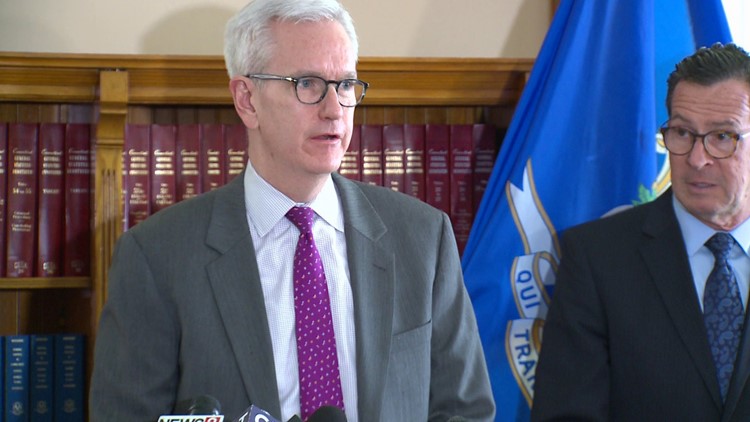HARTFORD — With robocalls and TV ads, the level of politicking enveloping a modern-era Connecticut chief justice nomination has reached unprecedented levels as Democrats and Republicans spar over whether Andrew McDonald should lead the state judiciary.
McDonald, nominated by Democratic Gov. Dannel P. Malloy, would be the first openly gay state Supreme Court chief justice in the country.
His chances were put in jeopardy more than a week ago when a tie vote by the legislature’s Judiciary Committee, following a marathon 13-hour hearing, sent the nomination to the full General Assembly with an unfavorable recommendation. The vote was mostly along party lines, with Republicans opposing McDonald.
The House of Representatives is scheduled to take up the nomination Monday.
Democrats have suggested Republicans are against McDonald because he is gay. Republicans criticized Democrats for making such an allegation, saying their opposition was based solely on decisions McDonald has made during his five years as a Supreme Court associate justice.
In support of McDonald, Democratic U.S. Reps. Jim Himes and Rosa DeLauro have called Republican lawmakers. McDonald’s friends, meanwhile, formed the lobbying group True Justice LLC.
True Justice is behind thousands of robocalls made to state voters urging them to call on their legislators to support McDonald. The group also has run an ad on local TV and its Facebook page that begins with a picture of President Donald Trump and Vice President Mike Pence, with the words “Stop the Hate.”
Bethany Berger, a professor at the University of Connecticut School of Law, said the partisan rancor surrounding McDonald’s nomination appears unmatched compared with other state Supreme Court nominations in recent history.
“I think it’s partly dislike of Gov. Malloy,” she said. “But I also think it’s a reflection of the polarization of politics nationally. And some members of the GOP here appear to be saying maybe we can win with these politics.”
Malloy is not seeking a third term in this year’s election amid low approval ratings.
Democrats hold a narrow majority in the House and there are an equal number of Democrats and Republicans in the Senate, with Democratic Lt. Gov. Nancy Wyman typically breaking any tie votes. One
Democratic senator, Gayle Slossberg, of Milford, has recused herself from voting on McDonald’s nomination, giving Republicans an edge.
Republicans and conservative groups say they have concerns that McDonald is an “activist” judge who legislates from the bench. They cite his being in the majority of a 4-3 Supreme Court decision in 2015 that effectively eliminated the state’s death penalty, among other rulings. They also express reservations about McDonald’s friendship with Malloy.
McDonald, a former Democratic state senator, was Malloy’s legal counsel in the governor’s office before joining the Supreme Court. He also was corporation counsel for the city of Stamford from 1999 to 2002 when Malloy was mayor.
The legislature overwhelmingly approved McDonald’s nomination as Supreme Court associate justice in 2013.
Senate Republican Leader Len Fasano said his party is not playing politics with the nomination as Democrats are, and he accused Democrats of using “bullying and intimidation tactics.”
“The attacks from prominent Democrats show an alarming level of politicization of a process that deserves more respect than the political circus they have turned it into,” Fasano said in a statement Friday.
Malloy addressed opposition to McDonald on Thursday.
“I hope this is not because he’s a gay man, that he’s being treated this way,” Malloy said. “I hope it’s not because he and I have known each other for a long period of time, that he’s being treated this way. But I do know that the way he is being treated, ultimately that could have a very damaging impact on our legal system in Connecticut.”
Judge nominations in the state are seldom politicized. Connecticut is among about a dozen states where judges are appointed, not elected, according to the American Bar Association.



